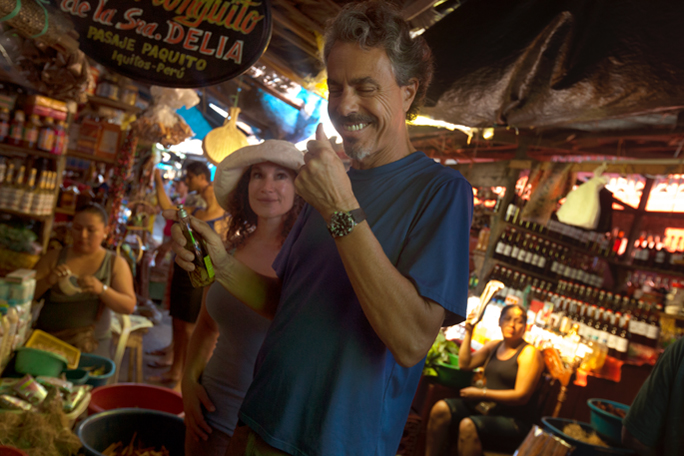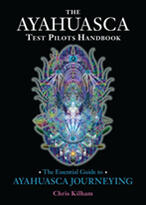Chris Kilham and Zoe Helene in Iquitos Market. Photo by Ivan Kashinsky
Kilham, who just released a new book, travels the world looking for herbal remedies.
At 61 years old, many people begin to ease toward retirement and the golf course. Not so for Massachusetts native Chris Kilham.
Kilham, who lives in the Western Mass. town of Leverett, is a self-professed “Medicine Hunter” who travels the globe—often with his artist and environmental activist wife, Zoe Helene—looking for herbal and natural remedies while establishing trade with the native people he encounters. “I really will go where others won’t and I really can find what others can’t,” Kilham says, adding that he is perfectly willing to go to “sketchy” locations. “I don’t stay in the hotel and make phone calls; I go out in the bush and hang out with the natives.”
Kilham says 20 years of research went into his now decades-long career as a medicine hunter, which led to him to create his company called Medicine Hunter, Inc. He also regularly appears on and is a columnist for Fox News, is an advisor for the Dr. Oz Show, a researcher for the French botanical extraction company Naturex, and a professor of ethnobotany at the University of Massachusetts Amherst, where he teaches a course called, “The Shaman’s Pharmacy” in the Department of Plant & Soil Sciences. He has also written 14 books, including a guide to using the notorious psychedelic drink ayahuasca titled, The Ayahuasca Test Pilots Handbook, which was released in November.
Eccentric and at times over-the-top, Kilham says he is behind some of the most well-known herbal remedies available today. His first big break came in the mid-90s at the hands of kava, a plant from the South Pacific said to induce relaxation and quell anxiety. He has also worked with maca, a Peruvian plant believed to improve sexual function and fertility, since 1998. “[Maca] went from being totally unknown when I started working with it to being one of the more popular botanicals now available on the market,” Kilham says.
And although some herbal remedies are not without controversy, Kilham remains resolutely in favor of them. “Most of the life-saving medicines in the world are in fact plant-derived,” he says. “For a long time, the media said there isn’t enough science on this. Well, I don’t know. There must be at least a million published scientific papers—is that not enough science? I mean, it’s good enough for the drug companies. Why isn’t it enough for medicinal plants?”
Kilham also says that it’s a widely held misconception that plant-based remedies are merely experimental, explaining that while they are not licensed as drugs, they are approved as herbs. “They’re already approved, they’re already in use, they’re already popular, and their popularity is increasing,” Kilham stresses. “They’re not drugs. They are herbs. The drug category is rife with ineffective, toxic, potentially lethal agents. I don’t really want to be thrown into that class.”
As for why the general public is often wary of natural therapies, Kilham says that the average person simply doesn’t know much about the topic. “They probably don’t know that there are hundreds of thousands of world-class Ph.D. scientists and thousands and thousands of medical doctors working around the clock on plant-based medicines, and that there’s actually more scientific, published literature on medicinal plants than there is on synthetic drugs,” he says.
Nonetheless, Kilham says the world of herbal medicine is something for which he truly has a passion. “My love of this work and my love of traveling the world and my ardent affection for indigenous, native people and my capabilities in terms of communication have all kind of aggregated to make me well-suited for this,” he says. “As long as I don’t suddenly get gored by a rhino or something, I’ll be doing this for quite a long time more.”



